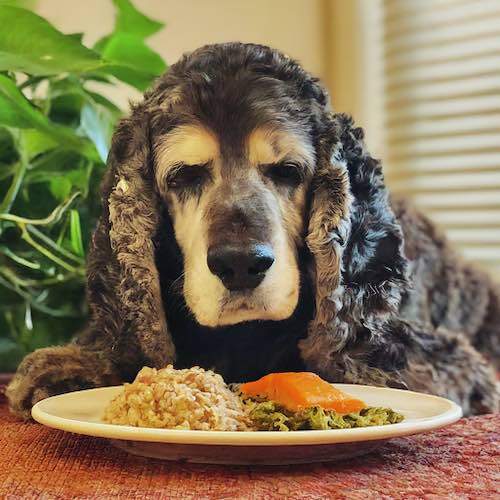The Best Diet for Senior Cocker Spaniels: Supporting Your Aging Friend
Introduction
Aging Cocker Spaniels, cherished for their gentle nature, expressive eyes, and joyful demeanor, experience several physiological changes that can affect their health, energy levels, and nutritional needs. These affectionate companions typically begin to show signs of aging around seven to nine years old, entering a stage where dietary adjustments become crucial to mitigate the effects of aging and to support their decreased activity levels, slower metabolism, and potential health issues such as joint discomfort, digestive problems, or weight fluctuations.
Tailoring their diet to these age-related changes is vital for maintaining their well-being and happiness during their senior years. Understanding the specific bodily changes and their implications on nutritional requirements is key. For instance, senior Cocker Spaniels might see a decline in muscle mass, necessitating a diet abundant in high-quality protein to support muscle maintenance.
As their digestive system becomes less efficient, the need for easily digestible foods and a boost in dietary fiber becomes apparent. Furthermore, the increased likelihood of chronic ailments like arthritis or cardiac issues underscores the importance of diets that promote joint health, cardiovascular function, and immune support.
Search: Best Selling Cocker Spaniel Dog Foods Online
This guide explores the best dietary practices for aging Cocker Spaniels, offering insights to help them remain vibrant, content, and healthy as they age. By choosing suitable foods and adapting meal portions to their evolving needs, owners can significantly enhance their senior Cocker Spaniels’ overall health.
Understanding Aging in Cocker Spaniels
Advancing into their senior years is a pivotal phase for Cocker Spaniels, necessitating heightened attention to their diet and nutrition. This period introduces notable changes in their physical condition and metabolic processes, significantly impacting their overall health.
Common issues like arthritis become more prevalent, leading to discomfort and lessened activity. Coupled with a natural reduction in metabolic rate, these changes highlight the need for dietary modifications to avert obesity—a condition that could amplify joint problems and lead to additional health complications.
Recognizing these health challenges is crucial for owners aiming to proactively support their aging Cocker Spaniel’s well-being through appropriate nutrition. A diet that’s lower in calories yet rich in essential nutrients aids in maintaining a healthy weight and supports joint health. Incorporating omega-3 fatty acids can help reduce inflammation, and making dietary adjustments to enhance meal appeal can ensure continued enjoyment of food. Identifying aging signs and adjusting the diet accordingly can profoundly impact their comfort and happiness in later life.
Nutritional Needs of Aging Cocker Spaniels
Reduced Calorie Intake
With a slowing metabolism, aging Cocker Spaniels require fewer calories to prevent obesity, which can exacerbate conditions like arthritis and diabetes.
Increased Protein
A diet rich in high-quality protein is crucial for preserving muscle health and supporting overall bodily functions, with careful consideration to not overload the kidneys.
Essential Fatty Acids
Omega-3 fatty acids, typically found in fish oil, are invaluable for aging Cocker Spaniels, aiding in joint health and alleviating arthritis discomfort.
Fiber
Enhancing the diet with fiber aids in weight management and digestive health, benefitting Cocker Spaniels with diabetes by stabilizing blood sugar levels.
Vitamins and Minerals
Increased levels of vitamins E and C, known for their antioxidant properties, support immune health; calcium and phosphorus are essential for sustaining bone health in senior Cocker Spaniels.
Recommended Foods for Aging Cocker Spaniels
When it comes to the dietary management of aging Cocker Spaniels, selecting the right food and supplements is paramount to support their health as they enter their senior years. The nutritional needs of senior dogs differ significantly from those of younger dogs, necessitating a diet that accommodates their slower metabolism, reduced energy requirements, and health conditions that may arise with age.
Specialized Senior Dog Foods
The market offers a range of specialized senior dog foods designed specifically for older dogs. These formulations are crafted to provide a balance of nutrients essential for maintaining the health of aging pets, including Cocker Spaniels. They typically feature reduced calorie content to prevent weight gain, which is crucial since obesity can exacerbate health problems such as arthritis and diabetes.
Enhanced fiber levels are included to promote digestive health and ensure smooth bowel movements, which can be a concern in older dogs. The protein content is carefully adjusted to be sufficient for sustaining muscle mass without overburdening the kidneys, which may become less efficient with age.
Fresh Foods for Added Nutrition
Incorporating fresh foods into your senior Cocker Spaniel’s diet can provide additional nutritional benefits. Lean meats like chicken or turkey, omega-3-rich fish like salmon, and a variety of vegetables can offer essential vitamins, minerals, and antioxidants. These not only contribute to the overall health and wellness of your pet but can also make meals more appealing for senior dogs whose appetite may have waned. Fresh foods should be introduced gradually and prepared in a dog-safe manner, avoiding any toxic ingredients and ensuring they are easily digestible.
The Role of Supplements
Supplements play a critical role in the dietary management of aging dogs. Glucosamine and chondroitin are widely recommended for supporting joint health and mobility, which is particularly important for Cocker Spaniels prone to hip dysplasia and arthritis. Omega-3 fatty acids, found in fish oil supplements, are beneficial for cognitive function, helping to stave off cognitive decline, and have anti-inflammatory properties that can alleviate symptoms of arthritis and improve skin and coat health.
Consulting with a Veterinarian
Before introducing any new foods or supplements into your senior Cocker Spaniel’s diet, it’s essential to consult with a veterinarian. They can provide guidance based on your dog’s specific health status, dietary needs, and any existing conditions. A veterinarian can also recommend the appropriate types and amounts of supplements to ensure they complement your dog’s diet without causing harm.
Tailoring the Diet to Individual Needs
Each senior Cocker Spaniel is unique, with individual dietary requirements based on their health, lifestyle, and preferences. Tailoring the diet to meet these specific needs can help manage weight, support organ function, and address any health concerns. For instance, dogs with heart conditions may require a diet lower in sodium, while those with kidney issues might need a diet with restricted protein. Furthermore, the texture and form of food might need adjustment for dogs with dental issues, making softer foods or wet foods more suitable.
Foods to Avoid
Certain foods can be extremely harmful to dogs, and some pose an even greater danger to senior Cockers.
-
High-Fat & Sodium: Fatty cuts of meat, processed foods, and salty snacks contribute to obesity and exacerbate heart problems common in older dogs. These can put excess strain on their joints and internal organs, potentially shortening their lifespan and reducing their quality of life.
-
Toxic Substances: Chocolate (especially dark chocolate), grapes, raisins, onions, garlic, and products containing the artificial sweetener xylitol are poisonous to dogs. Keep these out of reach! Theobromine in chocolate and substances in grapes/raisins can cause kidney failure, while onions and garlic damage red blood cells, potentially leading to anemia. Xylitol is even more dangerous, triggering dangerous drops in blood sugar and affecting liver function.
-
Dangerous Delights: Avocados, macadamia nuts, alcohol, and caffeinated drinks can trigger mild to life-threatening reactions, so they are completely off-limits. The persin in avocados can upset their stomachs, nuts are high in unhealthy fats, and alcohol/caffeine severely impact their neurological system.
-
Beyond the Basics: Some seemingly harmless foods might still be unsuitable for senior dogs. Dairy products can upset sensitive stomachs, raw meat may carry bacteria their weakened immune systems struggle to fight, and bones can splinter. Even specific fruits and veggies, while healthy in moderation, may need portion control or preparation to be safe.
Feeding Schedule and Portion Control
As they age, Cocker Spaniels experience natural changes in their metabolism and activity levels. This means responsible owners need to carefully adjust their feeding habits to ensure their beloved companions continue to thrive. Implementing a consistent feeding schedule and practicing mindful portion control are fundamental strategies for maintaining the health of senior Cocker Spaniels.
Why Smaller, More Frequent Meals? Senior dogs often have less efficient digestive systems. Dividing their daily food intake into smaller, more frequent meals eases digestion and nutrient absorption. Additionally, this provides a steadier supply of energy throughout the day, avoiding dramatic spikes and crashes.
The Importance of Portion Control: Senior Cocker Spaniels tend to burn fewer calories with decreased activity. Overfeeding can easily lead to unhealthy weight gain. Obesity puts significant strain on joints, increases the risk of heart disease, and can complicate other age-related conditions. Consulting your veterinarian can help determine the ideal portions for your dog’s specific needs.
Additional Considerations: Your veterinarian may recommend a dog food formulated specifically for seniors. These often have adjusted protein and fat levels, added fiber for digestion, and supplements to support joint health. Always provide fresh, clean water and talk to your vet about incorporating healthy treats like fruits and vegetables into your senior Cocker Spaniel’s diet.
Special Considerations
Catering to individual health issues and enhancing the appeal of meals are important considerations for the diet of an aging Cocker Spaniel. As dogs age, certain health conditions may arise. Kidney disease, joint pain, cardiac issues, and dental problems are all relatively common in older dogs.
If your senior Cocker Spaniel has any specific health challenges, working with your veterinarian to customize their diet is essential. A carefully tailored diet may involve specialized or restricted ingredients to reduce stress on organs, promote joint health, or address dental sensitivities.
Conclusion
As Cocker Spaniels age, their dietary requirements change, requiring owners to adjust their feeding practices to support their health and happiness. A balanced diet, tailored to their specific needs, is crucial for managing age-related conditions and enhancing their quality of life. Regular veterinary consultations offer invaluable tailored nutritional advice, ensuring your aging Cocker Spaniel continues to thrive.
Consultation with a Veterinarian
Before making any significant dietary changes, it’s essential to consult with a veterinarian. They can provide personalized advice based on your Cocker Spaniel’s health status, dietary needs, and any existing medical conditions, ensuring a nutrition plan that best supports their health and well-being in their senior years.




